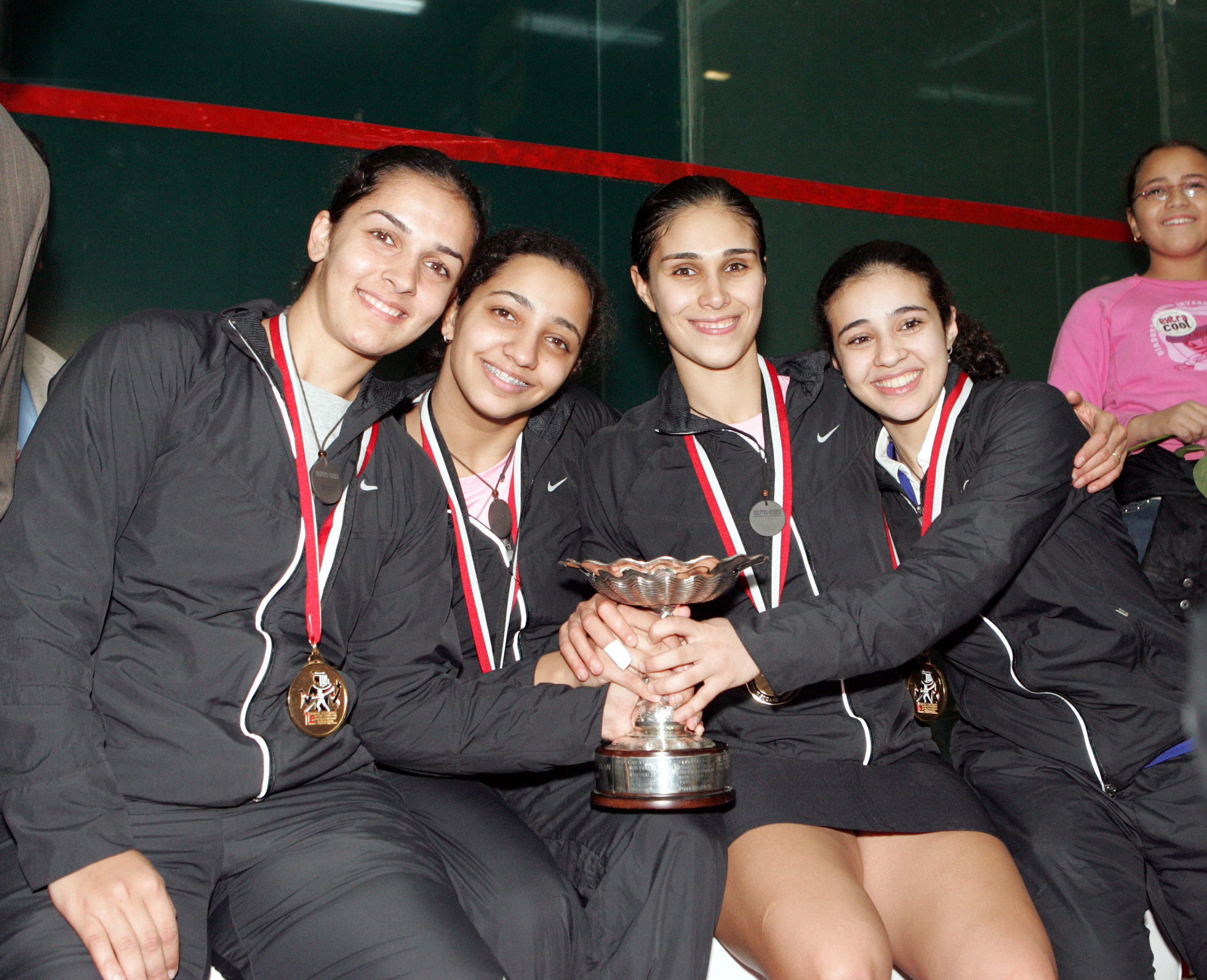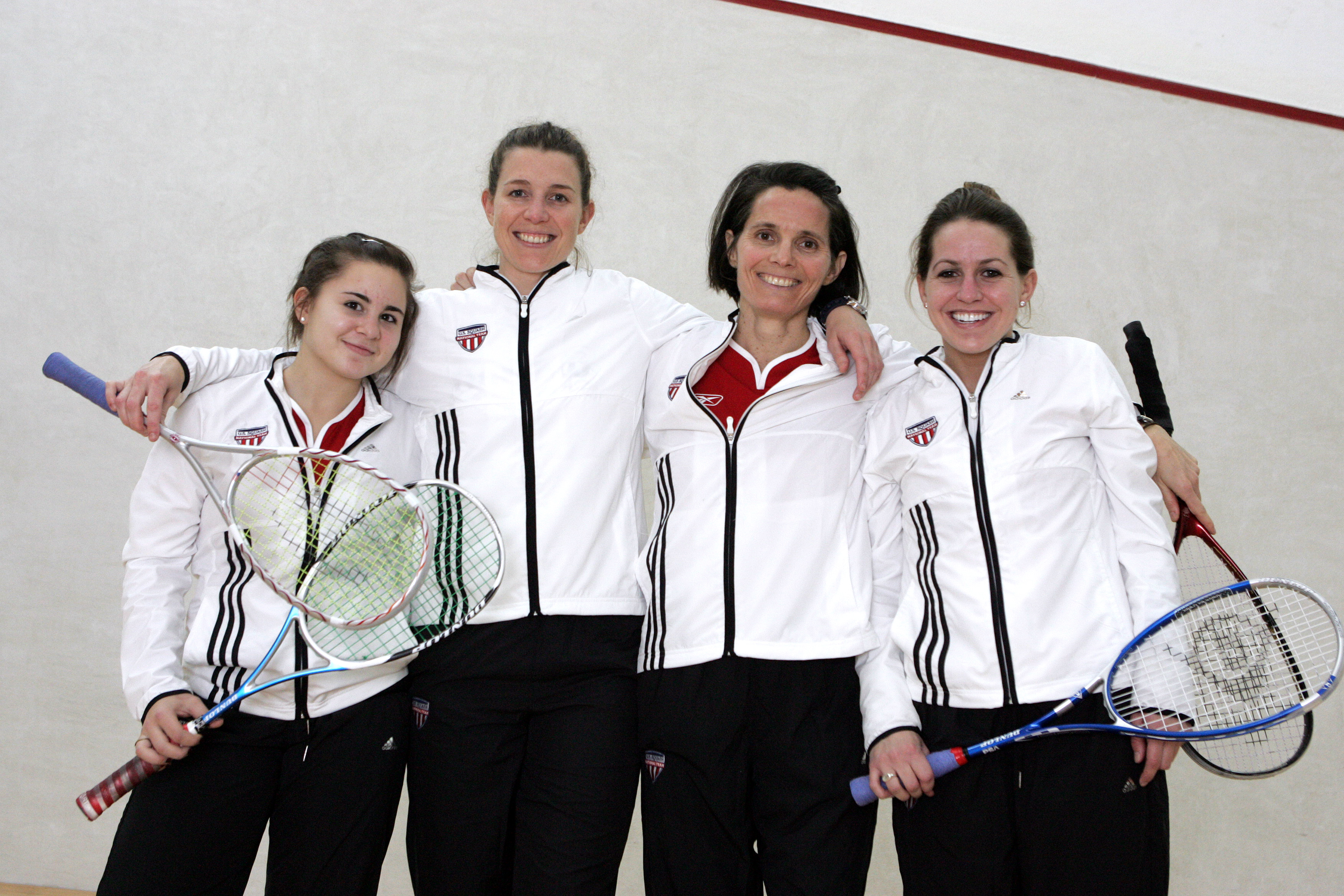
By Hope Prockop
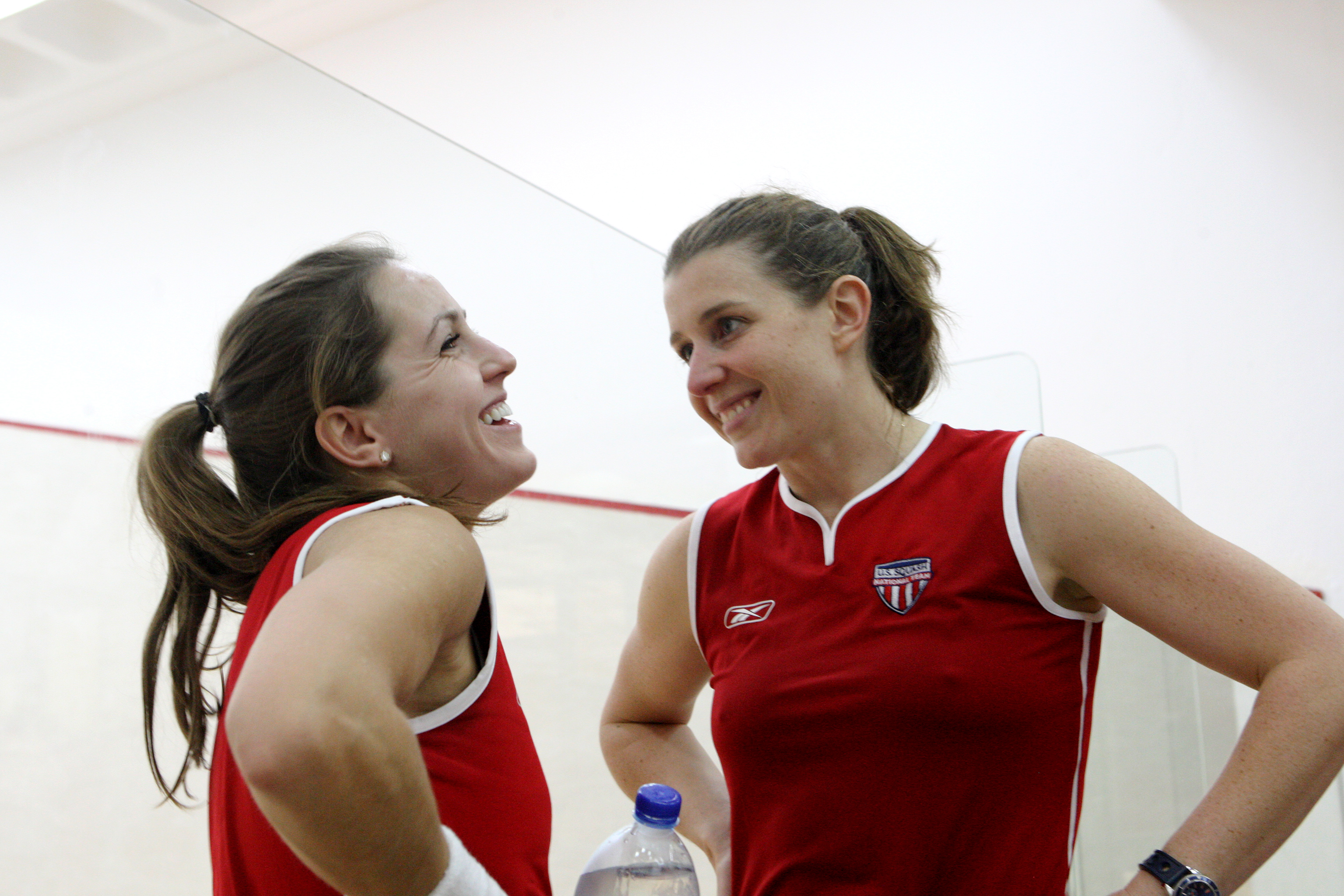
In the four weeks between US Team trials and our departure for the 16th Women’s World Teams Championships in Cairo, I was filled with enormous excitement and a healthy dose of anxiety. I was overjoyed to have earned another chance to represent the USA and play top notch international squash, but I didn’t know much Arabic and I had been warned not to drink anything but bottled water. Of my three teammates, I had met two of them only once. I knew an adventure was ahead.
True to the melting pot that is our country, U.S. SQUASH sent the following team. Our Coach and No. 1 player, also world ranked No. 4, and 31 years of age was Natalie Grainger, currently living in Greenwich, CT. Claire Rein-Weston, a 23-year-old Princeton squash captain and banker in her hometown of Seattle, WA, played No. 2 for USA. The No. 3 position was held by Olivia Blatchford, a remarkable 15-year-old player from Wilton, CT, who is soon to go professional. I was the No. 4 player. We were joined by U.S. SQUASH representative Conor O’Malley.
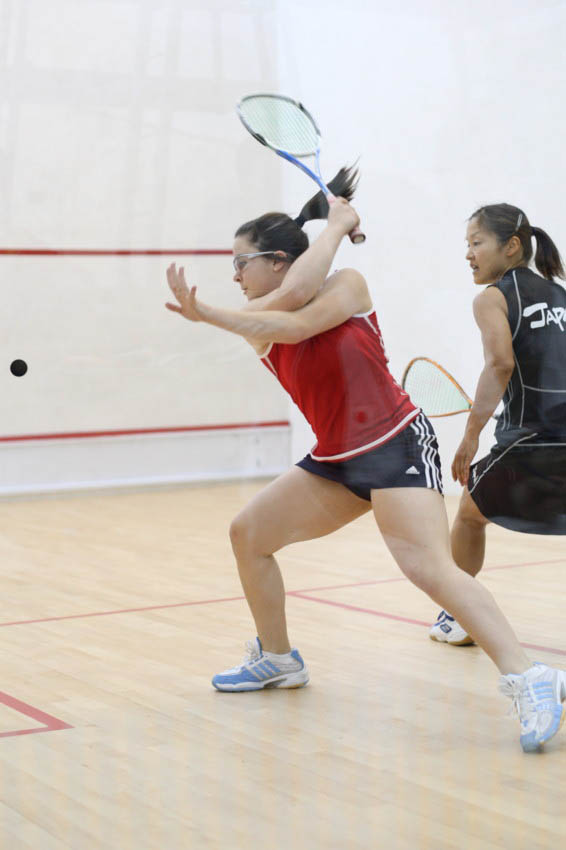
The team met in Cairo on Saturday, Nov. 29, and The Sonesta Hotel was our home for the week. The tournament committee and their 50-plus volunteers were more than welcoming upon our arrival. Each country was assigned a volunteer—an Egyptian college student in a program for hotel management, hospitality and tourism. USA was blessed by having Dina Atef—she was our lifeline, our translator and our biggest fan. Present at all of our matches, Dina made sure our stay was filled with absolutely everything we wanted and needed.
Sunday, Monday and Tuesday were matches in pool play and we enjoyed victories over Italy and China. We were squarely defeated by Ireland (5th place) and New Zealand (4th place). Wednesday was a player day off and the tournament committee organized a group outing to the Pyramids at Giza, the Sphinx and camel riding. After these tremendous sights and under Dina’s superb guidance, we took taxis from the camels back to the downtown area and continued our day of sightseeing. In Cairo, you can never be sure when entering a taxi if that ride will find you stopped in traffic and near dead from carbon monoxide poisoning and vehicle emissions or if that ride will find you on an open stretch of road awaiting death by a high speed crash. I found myself clutching a scarab, an ancient Egyptian good luck charm, which Dina and I had recently bargained for at the marketplace, and fortunately, we were spared. As Cairo rush hour hit and we saw and heard taxis gridlocked on the streets, we were relaxing in a felucca, a small, old, handmade sailboat. I was able to loosen my grip on the aforementioned scarab!
While we did some additional sightseeing during the week, such as visiting the Egyptian Museum, the Khan El Khalely marketplace, driving by Egyptian President Mubarak’s house and the Cairo Opera House, our lives really revolved around the squash stadium and the Hotel Sonesta. The squash stadium had four glass-back courts, an all-glass indoor stadium court as well as an outdoor all-glass exhibition court which was the venue for the nail-biting England-Egypt final on the last night. The stadium had a press room, internet access, warm-up room, a prayer room, a portable Starbucks stand as well as a Head racquets representative and supplier. Each day there were practice courts available and by 10am, the facility was teeming with volunteers, players, coaches, press and many unidentified Egyptian male spectators. Throughout the tournament, I was continually impressed by the level of play and thrilled to see such genuine support for smart and fair play. No dirty squash, except for perhaps my well-timed but poorly executed reverse corners—ancient artifacts from my hardball days. Many of the world’s best female players and coaches were there so at any given time, you could be watching or playing with them. I made sure to do both!
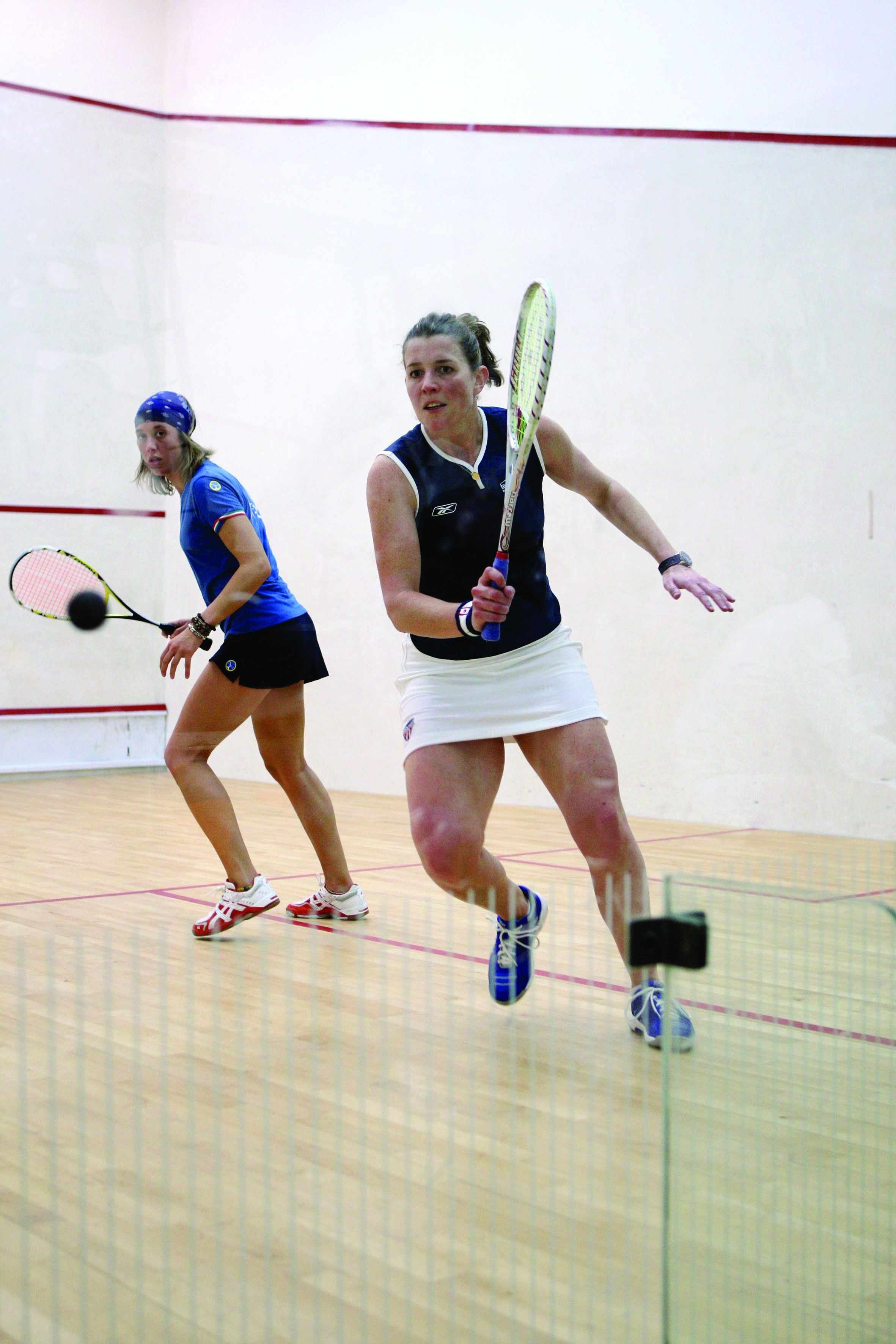
When we left the courts each day, we left behind the results of the day—win or loss. It seems as if all the teams did. The Sonesta Hotel lobby and its adjacent bar became the place of gathering, socializing, building and renewing friendships and oh, a little karaoke. Due to our pool play (NZ, Ireland, Italy, China) and Natalie Grainger’s South African heritage and her tour friendships, Claire Rein-Weston’s South African roots and her previous Egyptian training, Olivia Blatchford’s international contacts from living, touring and playing, and my love of the karaoke microphone, we all found ourselves enjoying every bit of the fun that is had with players and coaches from different countries. It’s amazing how many countries know repertoire from John Denver and the Eagles! Team USA may be remembered back at home for a 14th place finish, but we will be uniquely remembered by all those present in Cairo.
The week came to a close with a runner’s version of a photo finish in the final match between England and Egypt. Egypt prevailed 12-10 in the fifth game at the No. 2 spot. Egyptian media covered the event beautifully and the spirits were high all over Cairo.
Squash is growing everywhere, and the Egyptians proudly showed their strength and organization during the week.
It was a gigantic honor to be a part of this team, to get to know Natalie, Claire, Olivia and Conor, and to benefit from Natalie’s inspirational coaching and technique. I have been given a massive gift that will undoubtedly benefit my squash game and my life for years to come. To the rest of you who helped make it possible for this US Team, I thank you. I had a great time and I have tons of memories and photographs but I am glad to be home, drinking my own clean water and resuming squash games with a few new weapons in my arsenal. I plan to leave my scarab in my squash bag and if I am lucky enough, I can replace it at the 2010 World Teams (New Zealand) with a kiwi.
Egyptian Domination
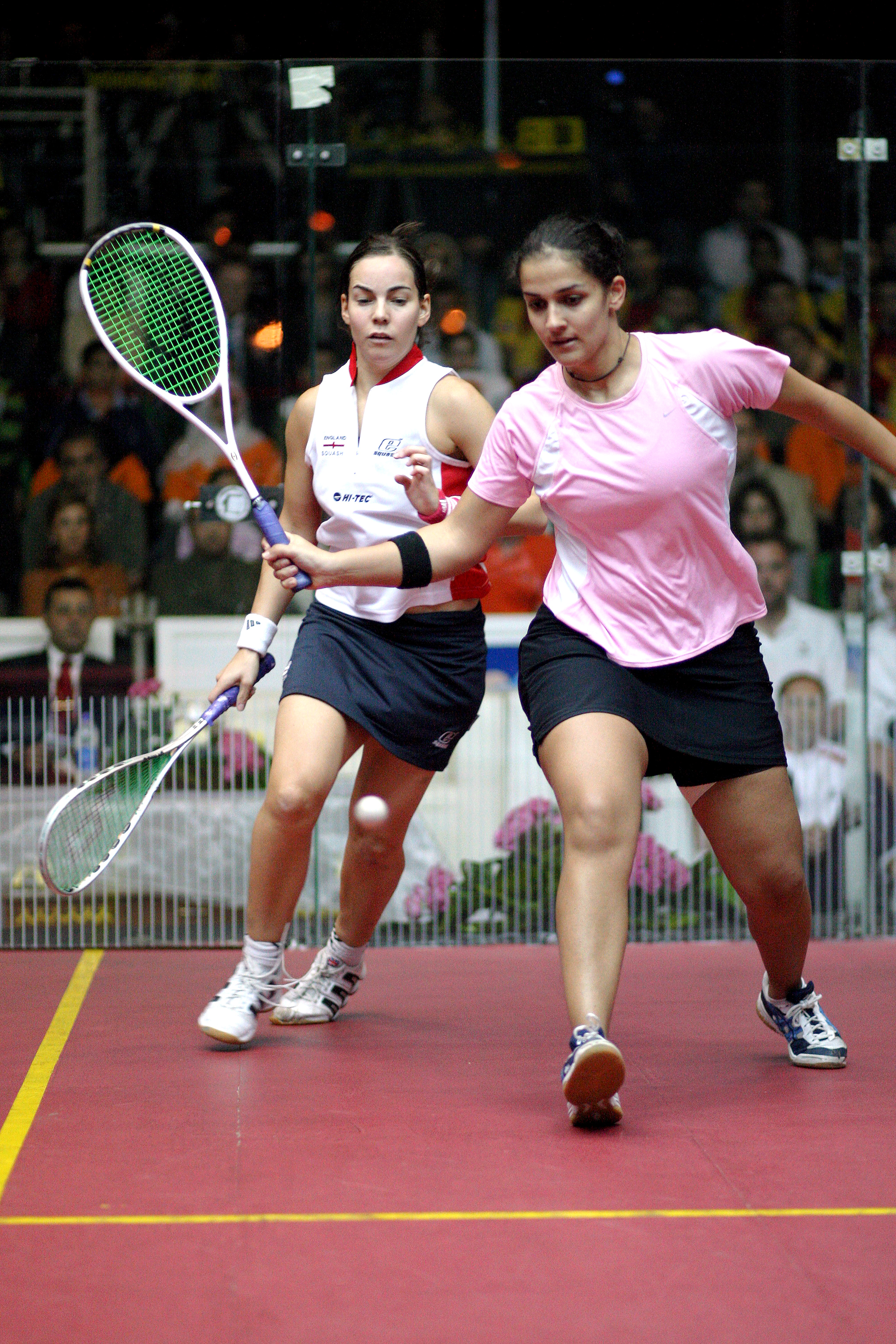
The team met in Cairo on Saturday, Nov. 29, and The Sonesta Hotel was our home for the week. The tournament committee and their 50-plus volunteers were more than welcoming upon our arrival. Each country was assigned a volunteer—an Egyptian college student in a program for hotel management, hospitality and tourism. USA was blessed by having Dina Atef—she was our lifeline, our translator and our biggest fan. Present at all of our matches, Dina made sure our stay was filled with absolutely everything we wanted and needed.
Sunday, Monday and Tuesday were matches in pool play and we enjoyed victories over Italy and China. We were squarely defeated by Ireland (5th place) and New Zealand (4th place). Wednesday was a player day off and the tournament committee organized a group outing to the Pyramids at Giza, the Sphinx and camel riding. After these tremendous sights and under Dina’s superb guidance, we took taxis from the camels back to the downtown area and continued our day of sightseeing. In Cairo, you can never be sure when entering a taxi if that ride will find you stopped in traffic and near dead from carbon monoxide poisoning and vehicle emissions or if that ride will find you on an open stretch of road awaiting death by a high speed crash. I found myself clutching a scarab, an ancient Egyptian good luck charm, which Dina and I had recently bargained for at the marketplace, and fortunately, we were spared. As Cairo rush hour hit and we saw and heard taxis gridlocked on the streets, we were relaxing in a felucca, a small, old, handmade sailboat. I was able to loosen my grip on the aforementioned scarab!
While we did some additional sightseeing during the week, such as visiting the Egyptian Museum, the Khan El Khalely marketplace, driving by Egyptian President Mubarak’s house and the Cairo Opera House, our lives really revolved around the squash stadium and the Hotel Sonesta. The squash stadium had four glass-back courts, an all-glass indoor stadium court as well as an outdoor all-glass exhibition court which was the venue for the nail-biting England-Egypt final on the last night. The stadium had a press room, internet access, warm-up room, a prayer room, a portable Starbucks stand as well as a Head racquets representative and supplier. Each day there were practice courts available.
